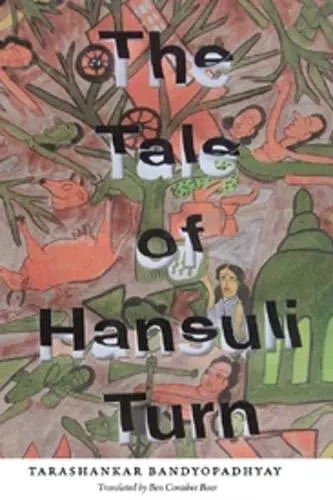The Tale of Hansuli Turn
Tarashankar Bandyopadhyay author Ben Conisbee Baer translator
Format:Paperback
Publisher:Columbia University Press
Published:9th Sep '16
Currently unavailable, and unfortunately no date known when it will be back

This novel depicts an untouchable "criminal tribe" transformed by the effects of World War II and India's independence movement. The village's struggles anticipate the dilemmas of rural development, ecological and economic exploitation, and dalit militancy that would occupy the center of India's post-Independence politics. Lyrically rendered by one of India's great novelists, this story of one people's plight dramatizes the anxieties of a nation. A terrifying sound disturbs the peace of Hansuli Turn, a forest village in Bengal. The community splits as to its meaning. Does it herald the apocalyptic departure of the old gods or is there a more rational explanation? The Kahars, inhabitants of Hansuli Turn, belong to an untouchable "criminal tribe" surviving at the fringe of the twin maelstroms of World War II and India's independence movement. Their headman, Bonwari, upholds the ethics of an older time, but the shelter of this fragile philosophy proves no match for the overpowering machinery of war and social upheaval. As Bonwari and the village elders come to believe the gods have abandoned them, younger villagers led by the rebel Karali seek other meanings and signs of a different way of life. Negotiating the colonial depredations of the 1939-1945 war, the oppressions of an indigenous caste system, and agrarian exploitation, the Kahars both fear and desire the consequences of a changing society that seems to promise them greater equality at the cost of losing their story. Rendered in striking experimental prose by one of India's great novelists, The Tale of the Hansuli Turn revises our understanding of modern South Asia with a dual invitation: to imagine from below the paradoxes of decolonization and to imagine the source of the Indian novel as the words of an old subaltern woman.
A terrifying sound disturbs the peace of Hansuli Turn, a forest village in Bengal, and the community splits as to its meaning. Does it herald the apocalyptic departure of the gods or is there a more rational explanation? The Kahars, inhabitants of Hansuli Turn, belong to an untouchable "criminal tribe" soon to be epically transformed by the effects of World War II and India's independence movement. Their headman, Bonwari, upholds the ethics of an older time, but his fragile philosophy proves no match for the overpowering machines of war. As Bonwari and the village elders come to believe the gods have abandoned them, younger villagers led by the rebel Karali look for other meanings and a different way of life. As the two factions fight, codes of authority, religion, sex, and society begin to break down, and amid deadly conflict and natural disaster, Karali seizes his chance to change his people's future. Sympathetic to the desires of both older and younger generations, Tarashankar Bandyopadhyay depicts a difficult transition in which a marginal caste fragments and mutates under the pressure of local and global forces. The novel's handling of the language of this rural society sets it apart from other works of its time, while the village's struggles anticipate the dilemmas of rural development, ecological and economic exploitation, and dalit militancy that would occupy the center of India's post-Independence politics. Negotiating the colonial depredations of the 1939-45 war and the oppressions of an agrarian caste system, the Kahars both fear and desire the consequences of a revolutionized society and the loss of their culture within it. Lyrically rendered by one of India's great novelists, this story of one people's plight dramatizes the anxieties of a nation and the resistance of some to further marginalization.
Following the lead of Gayatri Chakravorty Spivak in her wonderful translation of Mahasweta Devi's Chotti Munda and his Arrow (2003), the dialogue of this Bengali novel has been rendered into a very distinctive, colloquial English creole. The experiment pays off handsomely. The work achieves a rare immediacy, and Bengal becomes a weird, thickly textured place. Baer gives us jagged dialects of regional orature never before heard; this roughness captures the unheimlich of Trashankar's jungle situations with transcendent dread. -- Henry Schwarz, Georgetown University Of the great modern Bengali novelists, Tarashankar is probably least known for his writerly skills. Rather, his rural novels have found a lasting place in the canon by the sheer density of ethnographic richness and the vivid and earthy realism of his characters. Ben Baer's amazing translation of The Tale of Hansuli Turn brings to a wider readership a slice of untouchable life in Bengal at a moment of crisis. In the process, it also reveals the surprising sophistication of Tarashankar's own efforts at cultural translation. This is a world of Indian subalternity rarely captured before in English. -- Partha Chatterjee, Columbia University Wow! There is no other word for this monsoon flood of a novel, bursting the banks of respectability, urbanism, caste, education and linguistic decorum. Nothing in the rages, lusts or profanities of its characters fazes its intrepid translator. Through the style andcreole he creates, Bengali language and literature leap into a wholly new sound-world, with rhythms that subaltern communities worldwide - and friends of those communities - can dance to joyously. -- William Radice, SOAS, University of London
ISBN: 9780231149051
Dimensions: unknown
Weight: unknown
408 pages